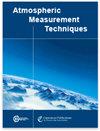用单面干涉图观测空间外差干涉仪的水平温度变化
IF 3.2
3区 地球科学
Q2 METEOROLOGY & ATMOSPHERIC SCIENCES
引用次数: 0
摘要
摘要。对中间层和低层热层的分析由于缺乏全球测量而受到影响。这是有问题的,因为这个区域有一个复杂的动态结构,重力波起着重要的作用。研制了一种四肢探测空间外差干涉仪(SHI),用于从O2 A波段发射中获取大气温度,并可用于导出该区域的重力波参数。利用焦平面阵列捕捉大气场景的二维空间分布。SHI将光谱信息叠加到横跨视距(LOS)的水平轴上。通常情况下,仪器利用横轴获取光谱信息,利用纵轴获取空间信息,即相应切点的温度观测值。这就得到了精细分辨的一维垂直大气温度剖面。但是,这种方法不利用数据中包含的横向跨los信息。本文研究了一种新的处理方法,即利用单面干涉图获得观测温度场的水平跨视界信息。因此,干涉图被分割,并且每一边在水平轴的中心被镜像。然后,每条边都可以用来检索单个的一维温度曲线。使用规定的水平温度变化来分析两个检索到的温度剖面的位置,因为这是推导波参数所需要的。我们表明,推导两个独立的温度曲线是可行的,然而,这将增加精确校准和处理的要求。本文章由计算机程序翻译,如有差异,请以英文原文为准。
Observation of horizontal temperature variations by a spatial heterodyne interferometer using single-sided interferograms
Abstract. Analyses of the mesosphere and lower thermosphere suffer from a lack of global measurements. This is problematic because this region has a complex dynamic structure, with gravity waves playing an important role. A limb-sounding spatial heterodyne interferometer (SHI) was developed to obtain atmospheric temperature retrieved from the O2 A-band emission, which can be used to derive gravity wave parameters in this region. The 2-D spatial distribution of the atmospheric scene is captured by a focal plane array. The SHI superimposes the spectral information onto the horizontal axis across the line-of-sight (LOS). In the usual case, the instrument exploits the horizontal axis to obtain spectral information and uses the vertical axis to get spatial information, i.e. temperature observations at the corresponding tangent points. This results in a finely resolved 1-D vertical atmospheric temperature profile. However, this method does not make use of the horizontal across-LOS information contained in the data. In this paper a new processing method is investigated, which uses single-sided interferograms to gain horizontal across-LOS information about the observed temperature field. Hereby, the interferogram is split, and each side is mirrored at the centre of the horizontal axis. Each side can then be used to retrieve an individual 1-D temperature profile. The location of the two retrieved temperature profiles is analysed using prescribed horizontal temperature variations, as it is needed for deriving wave parameters. We show that it is feasible to derive two independent temperature profiles, which however will increase the requirements of an accurate calibration and processing.
求助全文
通过发布文献求助,成功后即可免费获取论文全文。
去求助
来源期刊

Atmospheric Measurement Techniques
METEOROLOGY & ATMOSPHERIC SCIENCES-
CiteScore
7.10
自引率
18.40%
发文量
331
审稿时长
3 months
期刊介绍:
Atmospheric Measurement Techniques (AMT) is an international scientific journal dedicated to the publication and discussion of advances in remote sensing, in-situ and laboratory measurement techniques for the constituents and properties of the Earth’s atmosphere.
The main subject areas comprise the development, intercomparison and validation of measurement instruments and techniques of data processing and information retrieval for gases, aerosols, and clouds. The manuscript types considered for peer-reviewed publication are research articles, review articles, and commentaries.
 求助内容:
求助内容: 应助结果提醒方式:
应助结果提醒方式:


